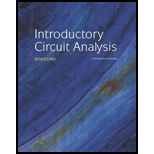Solutions for Laboratory Manual for Introductory Circuit Analysis
Problem 1P:
The numbers of orbiting electrons in aluminum and silver are 13 and 47, respectively. Draw the...Problem 2P:
Find the force of attraction in newtons between the charges Q1 and Q2 in Fig. 2.39 when r=1m r=3m...Problem 3P:
Find the force of repulsion in newtons between Q1 and Q2 in Fig. 2.40 when r=1ft r=10ft r=100yd...Problem 4P:
Plot the force of attraction (in newtons) versus separation (in inches) between two unlike charges...Problem 6P:
Determine the distance between two charges of 20 C if the force between the two charges is 3.6104N.Problem 8P:
8. What is the voltage between two points if 1.2 J of energy are required to move 10 mC between the...Problem 9P:
If the potential difference between two points is 60 V, how much energy is expended to bring 8 mC...Problem 10P:
Find the charge in coulombs that requires 200J of energy to be moved through a potential difference...Problem 11P:
How much charge passes through a radio battery of 9 V if the energy expended is 620 mJ?Problem 12P:
How much energy in electron volts is required to move1 trillion (1 million million) electrons...Problem 15P:
If a current of 40 mA exists for 1.2 min, how many coulombs of charge have passed through the wire?Problem 16P:
How many coulombs of charge pass through a lamp in 1.2 min if the current is constant at 250 mA?Problem 17P:
If the current in a conductor is constant at 2 mA, how much time is required for 6 mC to pass...Problem 22P:
Which would you prefer? A penny for every electron that passes through a wire in 0.01s at a current...Problem 23P:
If a conductor with a current of 200 mA passing through it converts 40 J of electrical energy into...Problem 24P:
Charge is flowing through a conductor at the rate of 420 C/min. If 742 J of electrical energy are...Problem 25P:
The potential difference between two points in an electric circuit is 12 V. If 0.4 J of energy were...Problem 28P:
For how many hours will a battery with an Ah rating of 80 theoretically provide a current of 1.28 A?Problem 29P:
A standard 12 V car battery has an ampere-hour rating of 40 Ah, whereas a heavy-duty battery has a...Problem 31P:
What is the percentage loss in ampere-hour rating from room temperature to freezing for the...Problem 32P:
Using the graph of Fig. 2.27, how much longer can you maintain 1.2 V at a discharge rate of 25 mA...Problem 33P:
A portable television using a 12 V, 3 Ah rechargeable battery can operate for a period of about 6 h....Problem 34P:
Discuss two properties of the atomic structure of copper that make it a good conductor.Problem 35P:
Explain the terms Insulator and breakdown strength.Problem 37P:
Using Table 2.2, determine the level of applied voltage necessary to establish conduction through...Browse All Chapters of This Textbook
Chapter 1 - IntroductionChapter 2 - Voltage And CurrentChapter 3 - ResistanceChapter 4 - Ohm’s Law, Power, And EnergyChapter 5 - Series Dc CircuitsChapter 6 - Parallel Dc CircuitsChapter 7 - Series-parallel CircuitsChapter 8 - Methods Of Analysis And Selected Topics (dc)Chapter 9 - Network TheoremsChapter 10 - Capacitors
Chapter 11 - InductorsChapter 12 - Magnetic CircuitsChapter 13 - Sinusoidal Alternating WaveformsChapter 14 - The Basic Elements And PhasorsChapter 15 - Series Ac CircuitsChapter 16 - Parallel Ac CircuitsChapter 17 - Series-parallel Ac NetworksChapter 18 - Methods Of Analysis And Selected Topics (ac)Chapter 19 - Network Theorems (ac)Chapter 20 - Power (ac)Chapter 21 - ResonanceChapter 22 - Decibels, Filters, And Bode PlotsChapter 23 - TransformersChapter 24 - Polyphase SystemsChapter 25 - Pulse Waveforms And The R-c ResponseChapter 26 - Nonsinusoidal Circuits
Sample Solutions for this Textbook
We offer sample solutions for Laboratory Manual for Introductory Circuit Analysis homework problems. See examples below:
Chapter 1, Problem 1PChapter 2, Problem 1PChapter 3, Problem 1PChapter 4, Problem 1PChapter 5, Problem 1PChapter 6, Problem 1PChapter 7, Problem 1PChapter 8, Problem 1PChapter 9, Problem 1P
Chapter 10, Problem 1PChapter 11, Problem 1PChapter 12, Problem 1PChapter 13, Problem 1PChapter 14, Problem 1PChapter 15, Problem 1PChapter 16, Problem 1PChapter 17, Problem 1PChapter 18, Problem 1PChapter 19, Problem 1PChapter 20, Problem 1PChapter 21, Problem 1PChapter 22, Problem 1PChapter 23, Problem 1PChapter 24, Problem 1PChapter 25, Problem 1PChapter 26, Problem 1P
More Editions of This Book
Corresponding editions of this textbook are also available below:
Introductory Circuit Analysis
12th Edition
ISBN: 9780137146666
Laboratory Manual For Introductory Circuit Analysis (pearson Custom Electronics Technology)
12th Edition
ISBN: 9780135060148
Introductory Circuit Analysis and Laboratory Manual for Introductory Circuit Analysis (12th Edition)
12th Edition
ISBN: 9780132110648
INTRODUCTORY CIRCUIT ANALYSIS
14th Edition
ISBN: 9780137594115
EBK INTRODUCTORY CIRCUIT ANALYSIS
13th Edition
ISBN: 8220100668234
Introductory Circuit Analysis
13th Edition
ISBN: 9780133923919
EBK INTRODUCTORY CIRCUIT ANALYSIS
13th Edition
ISBN: 9780133923872
Introductory Circuit Analysis; Laboratory Manual For Introductory Circuit Analysis Format: Kit/package/shrinkwrap
13th Edition
ISBN: 9780134297446
Introductory Circuit Analysis (13th Edition)
13th Edition
ISBN: 9780133923605
EBK INTRODUCTORY CIRCUIT ANALYSIS
13th Edition
ISBN: 9780100668232
Introductory Circuit Analysis
13th Edition
ISBN: 9780133923773
Introductory Circuit Analysis, Global Edition
13th Edition
ISBN: 9781292098951
INTRODUCTORY CIRCUIT ANALYSIS-LAB.MAN.
14th Edition
ISBN: 9780137283644
Introductory Circut Analysis, Custom Edition
9th Edition
ISBN: 9780536608765
Introductory Circuit Analysis - Textbook Only
10th Edition
ISBN: 9780005336496
Related Electrical Engineering Textbooks with Solutions
Still sussing out bartleby
Check out a sample textbook solution.
